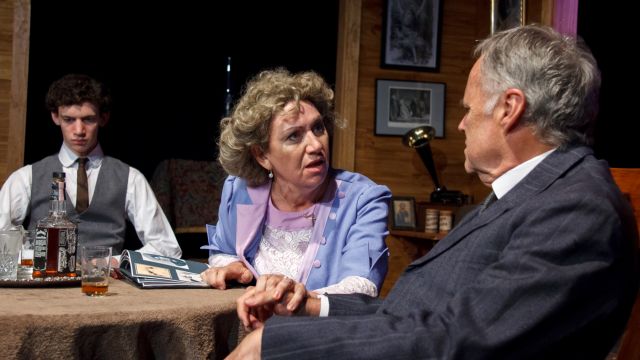Long Day's Journey Into Night
"Family isn't a word; it's a sentence." This reviewer cannot take credit for coining that particular phrase; nor can Eugene O'Neill - but if a tagline were needed to directly and pithily summarise the general mood of Long Day's Journey Into Night, it would probably do well enough.
Fortunately, like most of the best dramatic theatre, this play is far richer than a solitary phrase can suggest, with psychological complexities that a review can barely do justice to (it is strongly recommended that patrons purchase a programme to accompany the performance; as is the practice for a production from Independent Theatre, plentiful - and useful - background information is provided, including detail of the heavily autobiographical context in which the play was written).
The setting is 1912, Connecticut, but the fact that Long Day's Journey only premiered in 1956 after O'Neill's death (and against his stated wishes), yet was a formidable success, is a clear indication that the play and the people within it are not irrevocably tied to the conventions of the time in which they were created in a way that could alienate audiences in 2015.

As presented by the renowned Rob Croser, this very fine drama encompasses feelings and experiences that remain all-too-relevant to the challenges of family life: resentment, disappointment, frustration, blame, the prisons of our past - and maybe, eventually, a striving or fumbling towards a form of forgiveness...
One of the greatest strengths of O'Neill's text is its skill at dramatising and exploring the complex tragedy of young formative minds being moulded - and perhaps manipulated - by forces that they have little chance of resisting. The play goes further in its achievement by allowing us to clearly see the ways in which people can be both victimised and victimiser, with the quest for personal satisfaction - and perhaps justice - sustaining the members of the Tyrone family at the same time that it wears down their ability to truly communicate, fogs their minds against hope of understanding, and poisons their tongues against each other.
 The high level of detail in characterisation, as well as the time and patience exercised to allow events to proceed and unfold in a way that attempts to approximate the rhythms of real life, results in a generally engaging and absorbing experience, but also a long night in the theatre, one which some may find a little bit longer than really necessary, particularly in the second half.
The high level of detail in characterisation, as well as the time and patience exercised to allow events to proceed and unfold in a way that attempts to approximate the rhythms of real life, results in a generally engaging and absorbing experience, but also a long night in the theatre, one which some may find a little bit longer than really necessary, particularly in the second half.
Part of the reason for this may be the length of time, post-interval, given over to the eldest Tyrone son, Jamie. While there are no real technical deficiencies in Angus Henderson's performance, Jamie's character arc feels like the least compelling, and his relationships with fellow characters do not really intrigue at the level that those surrounding him do.
The presence of family servant Cathleen feels less satisfactory still. Though in some ways providing a theoretically useful perspective from someone affected by, and connected to, the family but remaining free from entanglement in it, Heather McNab's outgoing and heartily enunciated (not to mention accented) performance too often feels like it could be visiting from another play altogether, more of a distraction than an instructive contrast.
 Bronwyn Ruciak further enhances her already stellar reputation by delivering a tour-de-force as Mary Tyrone: mother, matriarch, morphine addict. Her performance is an exquisite balancing act, and her delicate characterisation is as beautiful as it is pitiable. David Roach is almost her equal in the role of patriarch James Tyrone; the performer is predominantly successful and admirable in his embodiment of a weary soul quietly struggling to maintain both dignity and authority, but one can occasionally sense him grasping for his lines in a way that proves momentarily distracting.
Bronwyn Ruciak further enhances her already stellar reputation by delivering a tour-de-force as Mary Tyrone: mother, matriarch, morphine addict. Her performance is an exquisite balancing act, and her delicate characterisation is as beautiful as it is pitiable. David Roach is almost her equal in the role of patriarch James Tyrone; the performer is predominantly successful and admirable in his embodiment of a weary soul quietly struggling to maintain both dignity and authority, but one can occasionally sense him grasping for his lines in a way that proves momentarily distracting.
Benji Riggs is an experienced and accomplished singer/dancer/musician, but is youthful enough to be a relative newcomer to adult theatre. There are brief moments when he seems to lack the gravity of presence required in a particular scene, but overall, Riggs makes the demanding and pivotal role of Edmund Tyrone into an effective - and affecting - protagonist; he is particularly impressive when depicting (and negotiating) the volatile, swaying emotions that alcohol brings out in his character, not to mention the scarily convincing cough that reverberates with fearful implications.
Without wishing to reveal anything major about the unfolding of the narrative (or its resolution), it can be safely said that this is not a play reliant on artificially inflated melodrama or blatant emotional catharsis. O'Neill aims for understanding achieved through general understatement, and Croser has honoured the text - and its audience - in this manner with his intelligent approach.
Given the infrequency with which the play is performed, audiences receptive to serious drama interpreted sensitively should make a bee-line for the Goodwood Institute while the season lasts.
Anthony Vawser
Photographer: Jacqui Munn
Subscribe to our E-Newsletter, buy our latest print edition or find a Performing Arts book at Book Nook.

